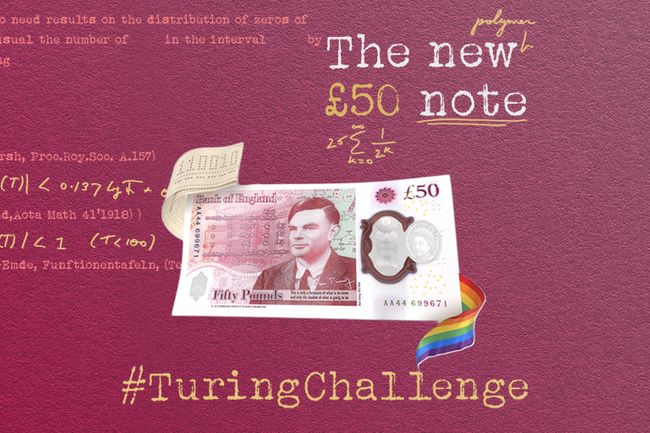
British digital espionage agency GCHQ has issued new puzzles to celebrate computing legend Alan Turing, ahead of his appearance on the new £50 note.
Turing is nowadays widely known for his huge achievements in the early days of computer science. During World War II he worked at the Government Code and Cypher School, one of GCHQ’s predecessors, where he was instrumental in using early computing techniques to break German naval encryption. This provided vital intelligence to the Allies during the pivotal stages of the Battle of the Atlantic, a contribution generally assessed as having significantly shortened the war.
After the war, Turing went on to further major successes in early computing. He is nowadays seen as the father of theoretical computer science and artificial intelligence (AI). His name lives on in the Turing Test, a standard method of inquiry in AI research, and in other AI concepts such as the Turing Machine.
Sadly Alan Turing was not celebrated as he deserved during his own lifetime, partly because many of his achievements remained secret until after his death and also because, as a gay man, he was a victim of persecution under the homophobic culture of the time. Turing was prosecuted for “gross indecency” in 1952. Despite the fact that he was described in court as “a national asset” by senior figures from GCHQ, he was found guilty and accepted hormonal castration treatment as an alternative to prison. He died in 1954 from cyanide poisoning at the age of 41 and the subsequent inquest determined the cause of death as suicide.
In recent times there has been a sustained process of belated recognition for Turing. In 2009, the then Prime Minister Gordon Brown made an official public apology on behalf of the British government for “the appalling way he was treated”, and Turing’s record was officially cleared of any wrongdoing by the Queen in 2013.
Turing’s modern day status as a national hero has now been conclusively endorsed by the Bank of England, as he appears on the new £50 note which will be issued in June. As is customary at GCHQ, the espionage agency has marked the occasion by releasing a new set of puzzles, the Turing Challenge.
How well do you really know your competitors?
Access the most comprehensive Company Profiles on the market, powered by GlobalData. Save hours of research. Gain competitive edge.

Thank you!
Your download email will arrive shortly
Not ready to buy yet? Download a free sample
We are confident about the unique quality of our Company Profiles. However, we want you to make the most beneficial decision for your business, so we offer a free sample that you can download by submitting the below form
By GlobalDataJeremy Fleming, the head of GCHQ, commented today:
“Alan Turing’s appearance on the £50 note is a landmark moment in our history. Not only is it a celebration of his scientific genius which helped to shorten the war and influence the technology we still use today, it also confirms his status as one of the most iconic LGBT+ figures in the world. Turing was embraced for his brilliance and shunned for being gay. His legacy is a reminder of the value of embracing all aspects of diversity, but also the work we still need to do to become truly inclusive.”
The agency noted that Turing himself once wrote:
“We can only see a short distance ahead, but we can see plenty there that needs to be done.”
Read more: Why Microsoft Custom Neural Voice raises ethical concerns




